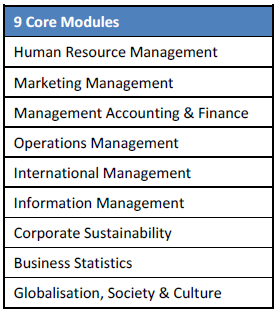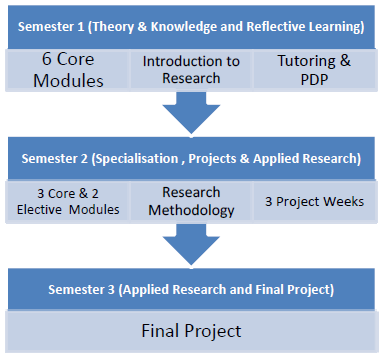
Within the MBA programme, the Semester 1 modules are basically about classic, ‘functional’ management subjects. However, during this semester, Wittenborg will stimulate a cross-functional orientation through cases and discussions about how a module’s subject-matter can contribute to the overall performance of the company and where cooperation between the various functional areas can be supportive to this. In a subject like Supply Chain Management (which in the present MBA programme is part of Operational Management), functional integration is an issue which has to be addressed before thinking of the ‘extended company’ (integrating with other links in the chain).
To give another example, the Balanced Scorecard (being part of Management Accounting) can be highly conducive to seeing the links between a company’s functional areas and activities; and because of that can elicit an interdisciplinary outlook. Also, a critical perspective is necessary, i.e. it is important to discuss within the context of the various functional areas (covered by the modules as programmed) the issues which are referred to by concepts such as ‘silos’, compartmentalization, poor organizational DNA, organizational myopia and the ‘not invented here’ syndrome. Such discussions promote a vision that exposes departmental thinking and embraces interdisciplinary ideas.

The Semester 2 modules by their very nature open up various interdisciplinary perspectives. In particular the modules of Corporate Sustainability, Strategic Management and Business Statistics are geared at connecting concepts and data of different kinds enabling an interdisciplinary understanding of corporate issues. Other subjects, such as ‘Globalisation, Society and Culture’, Entrepreneurship and Innovation present views of corporate and entrepreneurial activity which cut across the narrow boundaries of the traditional disciplinary and professional divides.
The 3 Project Weeks in Semester 2 are specially designed to promote interdisciplinary thinking as the consulting assignments given to students by the organisations involved require a broad problem solving, analytical approach, ushering in experience and knowledge from a range of business administration areas, and using a combined approach to offer plausible solutions and strategies. From a student’s perspective, a Personal Development Plan has been set already in Semester 1, during the tutoring sessions, and the optimal aim would be for the three project weeks to be interlinked by creating interdisciplinary themes that run through a main project or interlink smaller projects.